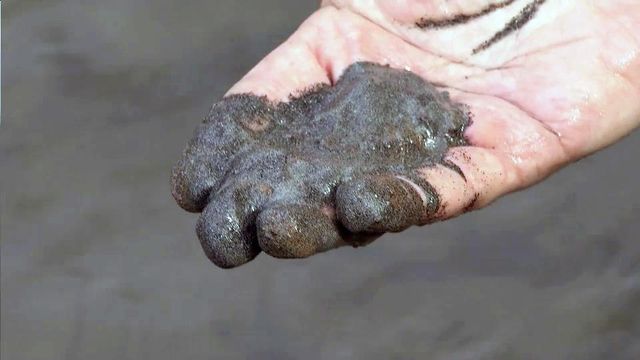Residents near Duke ash dumps told not to drink well water
North Carolina officials are advising dozens of residents near Duke Energy coal ash dumps not to drink or cook with water from their wells after tests showed contamination with toxic heavy metals.
Posted — UpdatedThe state Department of Environment and Natural Resources said Tuesday that tests of 87 private wells near eight Duke plants showed results that failed to meet state groundwater standards.
A state law passed after last year's massive spill into the Dan River required wells within 1,000 feet of Duke's 32 coal ash dumps across the state to be tested. About 145 private wells have been sampled since October.
Wayne Winstead's well was sampled in February. He didn't hear back from state officials until he received a letter from DENR detailing procedures for purifying his well water.
"I would like to know what we're drinking," he said. "It might be a lot of people getting sick of this, don't know what it is."
The letter Winstead received indicated traces of iron, lead, magnesium and arsenic were found in his well water.
Winstead has started using bottled water until he receives a satisfactory answer about the safety of his well water.
"I want to jump on it now and find out if this is doing any harm to us," he said. "You don't wait until the last minute. Then it will be too late."
Tom Reeder, the assistant secretary overseeing water quality for the state, said Duke will be required to provide the affected residents with an alternative water supply if it is determined the company's coal ash is the source of the groundwater contamination.
State officials said that, while some state groundwater standards were exceeded, in nearly all of the cases, the well water would still meet federal Safe Drinking Water Act requirements for municipal water supplies.
The agency's first public acknowledgement of the troubling test results came after The Associated Press reported earlier on Tuesday that 19 homeowners and a church near Duke's Buck Steam Station outside Salisbury had received written warnings.
Several of the letters cited high levels of vanadium, a naturally occurring element found in oil and coal classified as hazardous by federal health officials. Duke's self-reported toxic release inventory from 2011 shows about 1.5 million pounds of vanadium released into the environment from Duke's coal-fired plants that year, with the bulk of it flowing into the company's ash pits.
According to documents obtained by AP, test results from private drinking-water wells near the plant showed readings for vanadium as high as 86 times the state groundwater standard.
Duke also received a letter from the state citing elevated levels of antimony and manganese in water collected from a drinking well that serves the Buck plant. Both are found in coal ash.
In addition to Buck, the state said it had test results from private wells that failed to meet groundwater standards near Duke's Allen, Asheville, Belews Creek, Cliffside, Marshall, Roxboro and Sutton facilities. Wells near coal ash sites in Moncure and Goldsboro haven't been tested.
Duke spokeswoman Erin Culbert said the chemicals found in the private well near the company's ash dumps could also be naturally present in local soils.
"Based on the state's test results we've reviewed thus far, we have no indication that Duke Energy plant operations have influenced neighbors' well water," Culbert said.
The nation's largest electricity company, Duke stores more than 150 million tons of coal ash in 32 dumps at 14 power plants in North Carolina.
In February, federal prosecutors charged Duke with nine criminal counts over years of illegal pollution leaking from ash dumps at five of the plants. The company has said it intends to plead guilty to the charges and pay $102 million in fines and restitution.
A separate state law passed in the wake of the Dan River spill requires the company to move or cap all of its dumps by 2029.
The company has three open-air pits at Buck that cover 134 acres and contain more than 5 million tons of coal ash. The ash is a byproduct of burning coal to generate electricity. It contains numerous toxic heavy metals, including mercury, lead and arsenic.
Many residents living near the plant in the close-knit rural community of Dukeville have long been concerned that Duke's coal ash might be making them sick.
AP reported in June that testing of residential wells conducted by an environmental group found readings for potentially toxic chemicals associated with coal ash at levels exceeding state groundwater standards.
Though similar readings were self-reported from Duke's own monitoring wells ringing its dumps, both the company and state health officials said last year that there was no evidence the chemicals were coming from the coal ash pits.
“Duke continues to be dangerously in denial that these sites have deprived its neighbors of safe water," Catawba Riverkeeper Sam Perkins said. "We know the solution to this problem, and it is to move the material away from water and wells and to a lined, monitored site.”
John Suttles, a senior attorney at the Southern Environmental Law Center, said the latest test results confirm what environmental groups suing Duke over its pollution have been saying in court for years.
"Duke's coal ash pits are leaking toxic pollutants into groundwater," Suttles said. "To protect these residents Duke should provide safe, clean drinking water. This news underscores the critical importance of removing coal ash from leaking, unlined pits to dry, lined storage away from our waterways and drinking water sources."
Copyright 2024 by WRAL.com and the Associated Press. All rights reserved. This material may not be published, broadcast, rewritten or redistributed.






